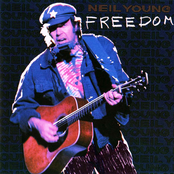Freedom

Biography
Freedom is the eighteenth studio album by Canadian rock musician Neil Young, released on October 2, 1989. Freedom effectively relaunched Young's career after a largely unsuccessful decade. After many arguments (and a lawsuit), Young left Geffen Records in 1988 and returned to his original label, Reprise, with This Note's for You. Freedom, however, brought about a new, critical and commercially successful album. This album was released in the United States as an LP record and a CD in 1989. Stylis...
Freedom is the eighteenth studio album by Canadian rock musician Neil Young, released on October 2, 1989. Freedom effectively relaunched Young's career after a largely unsuccessful decade. After many arguments (and a lawsuit), Young left Geffen Records in 1988 and returned to his original label, Reprise, with This Note's for You. Freedom, however, brought about a new, critical and commercially successful album. This album was released in the United States as an LP record and a CD in 1989. Stylistically, the album was one of Young's most diverse records, ranging from acoustic love songs to raging rockers. Three of the songs on Freedom ("Don't Cry," "Eldorado" and "On Broadway") had previously been released on the Japan and Australia-only EP Eldorado, and featured heavy waves of thundering distortion and feedback, juxtaposed with quieter sections. Freedom contains one song, "Rockin' in the Free World", that bookends the album in acoustic and electric variants, a stylistic choice previously featured on Rust Never Sleeps. The song, despite lyrics critical of the then-new George H. W. Bush administration ("we got a thousand points of light"; "kinder, gentler machine gun hand"), became the de facto anthem of the collapse of Communism. An edited cut of the electric version of the song was used over the final credits of Michael Moore's film Fahrenheit 9/11, and the song was re-released as a single at the time of the film's release. Freedom has received mainly positive reviews, especially in comparison to the rest of his '80s work. AllMusic's William Ruhlmann rated the album four-and-a-half out of five stars, explaining that it "was the album Neil Young fans knew he was capable of making, but feared he would never make again." He also stated that "there were tracks that harked back to [his] acoustic-based, country-tinged albums."[1] Robert Christgau, writing for The Village Voice, rated it an A. He declared that it contains a combination of "the folk ditties and rock galumph that made him famous" and "the Nashvillisms and horn charts that made him infamous." He also stated that "it features a bunch of good stuff about a subject almost no rocker white or black has done much with--crack". David Fricke of Rolling Stone rated it five out of five stars. He called it "the sound of Neil Young, another decade on, looking back again in anger and dread." He also explained that it is about "the illusion of freedom" and "Young's refusal to accept that as the last word on the subject." He summed up the review by calling it "a harsh reminder that everything still comes with a price." AllMusic reviewer Matthew Greenwald offered strong praise for the second track, "Crime in the City", calling it "undoubtedly the centerpiece of the album", "cinematic in scope", and "one of Neil Young's most accomplished works" Read more on Last.fm. User-contributed text is available under the Creative Commons By-SA License; additional terms may apply.

